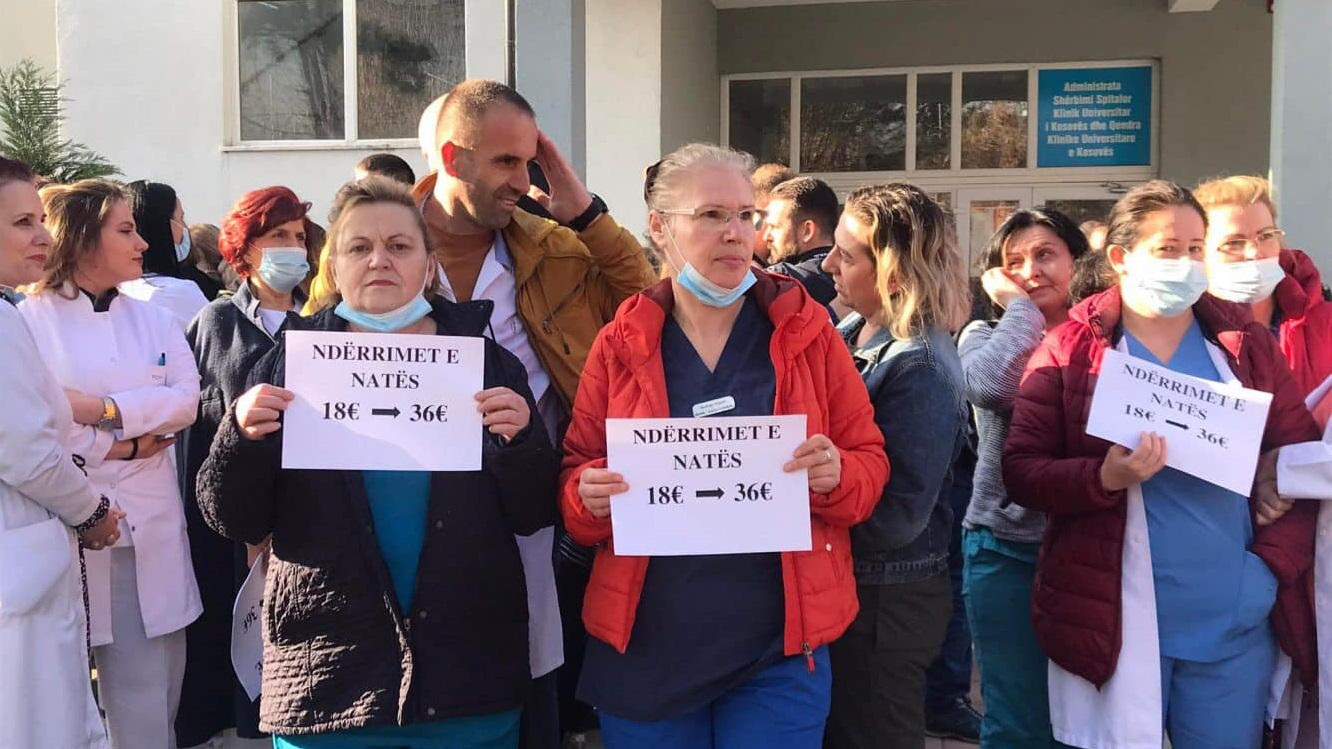Rising living costs are adding to the frustration of health workers in Kosovo, who have been campaigning for increased salaries and better staffing in public health institutions throughout the pandemic. After a one-hour strike on April 5 organized by the nurses’ trade union Sindikata e Infermierëve të Kosovës (SIK), where nurses demanded the doubling of night shift work rates from 18€ to 36€ and increase of the salary coefficients among other things, health workers’ organizations continue to warn that the lack of action by the government might lead to further problems in the health system.
The strike took place in several public health institutions, including the University Clinical Center of Kosovo in Priština, and hospitals in Peja, Mitrovica, and other towns.
At the moment, nurses and physicians in Kosovo are paid around 400€ and 600€, respectively. The income of physicians should be noticeably increased by a new reform planned by the government, but other groups of health workers could only count on smaller increases, which would not be enough to improve their living standard in a substantial way.
Low salaries and bad working conditions in the public health sector are feeding the wave of health workers’ emigration towards other countries, particularly in the European Union. According to SIK, 384 nurses left the country in 2021, and the trade union expects another 1,000 to do the same in 2022. The rising numbers are a cause for concern as even without losing more health workers, the health system in Kosovo needs to employ an additional 5,000 nurses to reach adequate staff to patient ratios, alerted the trade union.
Fitim Havolli, a representative of SIK, warned in March that the nurse-to-patient ratios in Kosovo were problematic long before the pandemic, and little to no improvement can be noted since. “While the WHO reports that countries with stable health systems have a nurse to patient ratio of approximately 1:7, the situation in Kosovo is completely different. I personally worked alone in a hospital ward with 11 two-bed rooms, which means caring for 22 patients, all through the pandemic,” said Havolli to Al Jazeera Balkans.
While physicians are paid more, their working conditions are not significantly better. Many of them also choose to leave Kosovo instead of keeping their jobs in public hospitals. The Kosovo Medical Chamber warned that 450 physicians have left the country since 2018. “We are witnessing the new generation of health workers leave, including junior doctors and young nurses and midwives,” said Besim Kodra from the Alliance for Patients’ Rights.
Emigration of health workers has also led to an increase of their average age, which for nurses now stands at 50 years. Although both patients and health workers notice that there is cause for serious concern, the government is not dealing with the subject adequately. Among other things, they are not taking steps to at least retain the nurses who have been employed on temporary contracts to boost pandemic response. In one of its most recent communications to their member base and the public, SIK raised the issue of the status of temporary staff as their contracts come to an end, and demanded that they be kept on permanent contracts instead.
“Social and economic welfare, the development of adequate working conditions for nurses, midwives, and other health professionals would result in improved quality of care delivery to the benefit of the whole society,” stated SIK in a press release explaining their plans for workers’ actions.
Read more articles from the latest edition of the People’s Health Dispatch and subscribe to the newsletter here.





